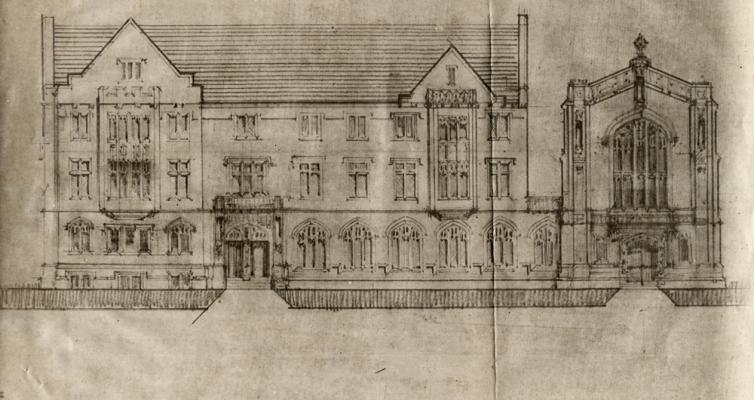History

William Rainey Harper, the first president of the University of Chicago, was also a distinguished Semiticist and a member of the Baptist clergy. He believed that a great research university ought to have as one of its central occupations the scholarly study of religion. These commitments led him to bring the Morgan Park Seminary of the Baptist Theological Union to Hyde Park, making the Divinity School the first professional school at the University of Chicago. First chartered in 1865, the Divinity School was incorporated into the University soon after the latter's inception in 1890.
Laying the cornerstone of Swift Hall. Photo courtesy of The University of Chicago Photographic Archive.
The Divinity School has pursued Harper’s vision of an institution devoted to systematic inquiry into the manifold dimensions of religion, seeking to serve both those preparing for careers in teaching and research and those preparing for careers in ministry. The School has served for decades as the largest single educator of faculty members for theological seminaries, departments of theology, and programs in religious studies across the spectrum of institutions that comprise American higher education. At the same time, the School is privileged to number among its alumni a long and distinguished list of religious leaders.
The dominant ethos of the University of Chicago – where ideas are subject to the highest standards of evidence and argument, and where the cultivation of knowledge through research is a primary aim – imbues all of the Divinity School’s degree programs. The work of the faculty is organized into eleven areas of doctoral study, with many faculty contributing to more than one area. While these areas reflect an historic strength in the study of Judaism and Christianity, the Divinity School is also renowned for the study of South and Southeast Asian religions (Buddhism, Hinduism, and Jainism in particular) and has more recently developed dynamic programs in Islamic Studies and Chinese religions. There is no privileged intellectual place given to any tradition in the work of the Divinity School: no religious convictions are taken for granted; and the claims and phenomena of any and all particular religious traditions are assessed by standards of reasoned inquiry.
The four degree programs of the Divinity School train students for specialized knowledge in a range of religious traditions and in diverse methodological approaches to the study of religion itself. The Divinity School also provides undergraduate instruction in a wide array of topics concerning religion through its new Core sequence, “Religion: Cosmos, Conscience, and Community;” other course offerings in the College, and its Religious Studies major and minor. Across all its programs, the values of critical engagement and research guide the entire educational enterprise of the School.
Learn more about the history of The University of Chicago.

